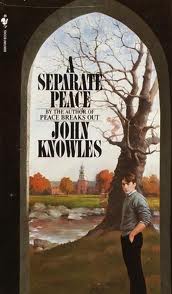In the book A Separate Peace by John Knowles, one of the main themes is the effects of realism, idealism, and isolationism on Brinker, Phineas, and Gene. Though not everyone can be described using one of these approaches to life, the approaches completely conform to these characters to create one realist, one idealist, and one isolationist; thereby providing the foundation of the novel.
The realist is Brinker. Brinker’s realism takes on a very morbid quality after Gene decides not to enlist with him, do to Phineas’s return to Devon. Brinker still sees everything the way it is, but begins to think that the way it is, is bad.
On page 122, he is quoted as saying, “Frankly, I just don’t see anything to celebrate, winter or spring or anything else.” Brinker will scrutinize any incident until he finds a dark side to it, because, in his mind, at least one side of everything is a dark side. Already we have the footing for our climax.
Phineas (Finny) is the idealist. Like Brinker, Finny’s approach experiences a grim metamorphosis. Before his accident, Finny sees the world as a glorious playing field and life as a never-ending game. After his accident; however, Finny begins to view the world through the eyes of a paranoid old man who is always seeing something covert in everything. On page 106, Finny even goes as far as to ask Gene, “Do you really think that the United States of America is in a state of war with Nazi Germany and Imperial Japan?” This outlook is a mental facade that only succeeds in setting Finny up for a harder fall. Finally, there is the isolationist, Gene.
Gene’s approach is austere from the beginning. It is Gene who generates the dark change in the others. Gene looks for danger in everything he is emotionally close to. When he finds danger, he ostracizes himself from whatever it is that is posing a threat to him. If he can not find danger, as with Finny, he creates it. On page 45 he strives so hard to create danger in Finny that he falsely concludes that, “Finny had deliberately set out to wreck my studies.” This creates the story’s main conflict and brings about Gene’s spontaneous act of pure evil that haunts him and the reader throughout the remainder of the book.
These characters and these approaches to life fit together like the pieces of a jigsaw puzzle to create an intriguing heart wrenching tragedy about friendship, war, and loss. These pieces did not just happen to fall into place. The author knew exactly what he was doing when he assigned these traits to these characters. He was building the destruction of a separate peace.

